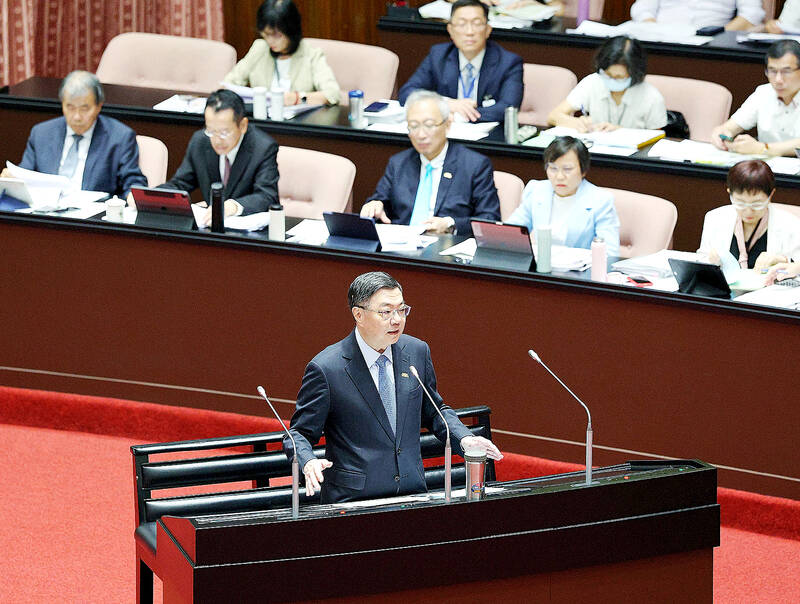A Cabinet reshuffle is to be finalized later this week, with more than five senior officials expected to be replaced, Premier Cho Jung-tai (卓榮泰) said at the Legislative Yuan in Taipei yesterday.
While confirming that the reshuffle would be completed this week, Cho declined to elaborate on the scale of the change.
However, he acknowledged that more than five ministers or deputy ministers would be replaced, given that some officials had already tendered their resignations.

Photo: CNA
He was referring to Minister of Economic Affairs J.W. Kuo (郭智輝), who cited health concerns after 15 months in office, and Minister of Digital Affairs Huang Yen-nun (黃彥男), who said he would return to his previous research work. Deputy Minister of Education Benson Yeh (葉丙成) has also tendered his resignation.
Cho said the reshuffle would be the result of a “comprehensive” review of the current Cabinet and reflect new policy priorities that President William Lai (賴清德) pledged last week.
Shortly after recall votes targeting seven Chinese Nationalist Party (KMT) lawmakers failed on Saturday, dealing a blow to his government, Lai vowed that the new Cabinet would ensure that his administration would be more effective in solving problems and responsive to public opinion.
Lai said that while Cho had also expressed an intention to step down, he had been persuaded to stay on as premier.
The Democratic Progressive Party (DPP) government has suffered major setbacks after failed attempts to push for the recall of 31 KMT lawmakers and having a 20 percent baseline tariff imposed on Taiwanese goods sold to the US, prompting the party to make changes.
Lai said that his administration would prioritize an agenda focused on the economy and people’s livelihoods, and pursue more dialogue with the opposition. The administration had been engaged in a stand-off with the opposition-controlled legislature since Lai took office in May last year.
Cho yesterday said that the Cabinet would work toward improving its relationship with opposition leaders and lawmakers, as several bills concerning budgets and special allocations still require legislative approval.
“[We] hope the legislature will give us this opportunity,” he said.
However, the government’s ongoing challenges of several opposition-backed bills passed by the legislature at the Constitutional Court are “not open for discussion,” he said.
Over the past year, the DPP government has brought several pieces of legislation to court in an effort to overturn them, including the 2025 central government budget and measures mandating a larger share of tax revenue for local governments.
The Cabinet also plans to challenge in court the legislature’s approval of increases in military personnel allowances.

Taiwan is projected to lose a working-age population of about 6.67 million people in two waves of retirement in the coming years, as the nation confronts accelerating demographic decline and a shortage of younger workers to take their place, the Ministry of the Interior said. Taiwan experienced its largest baby boom between 1958 and 1966, when the population grew by 3.78 million, followed by a second surge of 2.89 million between 1976 and 1982, ministry data showed. In 2023, the first of those baby boom generations — those born in the late 1950s and early 1960s — began to enter retirement, triggering

One of two tropical depressions that formed off Taiwan yesterday morning could turn into a moderate typhoon by the weekend, the Central Weather Administration (CWA) said yesterday. Tropical Depression No. 21 formed at 8am about 1,850km off the southeast coast, CWA forecaster Lee Meng-hsuan (李孟軒) said. The weather system is expected to move northwest as it builds momentum, possibly intensifying this weekend into a typhoon, which would be called Mitag, Lee said. The radius of the storm is expected to reach almost 200km, she said. It is forecast to approach the southeast of Taiwan on Monday next week and pass through the Bashi Channel

NO CHANGE: The TRA makes clear that the US does not consider the status of Taiwan to have been determined by WWII-era documents, a former AIT deputy director said The American Institute in Taiwan’s (AIT) comments that World War-II era documents do not determine Taiwan’s political status accurately conveyed the US’ stance, the US Department of State said. An AIT spokesperson on Saturday said that a Chinese official mischaracterized World War II-era documents as stating that Taiwan was ceded to the China. The remarks from the US’ de facto embassy in Taiwan drew criticism from the Ma Ying-jeou Foundation, whose director said the comments put Taiwan in danger. The Chinese-language United Daily News yesterday reported that a US State Department spokesperson confirmed the AIT’s position. They added that the US would continue to

The number of Chinese spouses applying for dependent residency as well as long-term residency in Taiwan has decreased, the Mainland Affairs Council said yesterday, adding that the reduction of Chinese spouses staying or living in Taiwan is only one facet reflecting the general decrease in the number of people willing to get married in Taiwan. The number of Chinese spouses applying for dependent residency last year was 7,123, down by 2,931, or 29.15 percent, from the previous year. The same census showed that the number of Chinese spouses applying for long-term residency and receiving approval last year stood at 2,973, down 1,520,